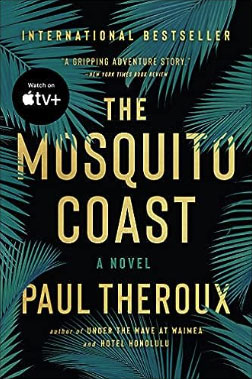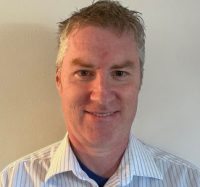The ‘Coast’ is Hardly Clear in Theroux’s ‘Mosquito’
Review An assessment or critique of a service, product, or creative endeavor such as art, literature or a performance.
By Michael Malone
 The Mosquito Coast is a look at a family that departs the U.S., their headstrong father fed up with America and its materialism and relocates to the Honduran jungle. Father Allie Fox is headstrong and brilliant, and a serious jackass.
The Mosquito Coast is a look at a family that departs the U.S., their headstrong father fed up with America and its materialism and relocates to the Honduran jungle. Father Allie Fox is headstrong and brilliant, and a serious jackass.
As the novel begins, Allie is a handyman on a farm in central Massachusetts and is a bit of an inventor–coming up with creative machinery to help the farm owner do his business. He’s a fully formed DIY guy. The book reads, “When Father said, the next day, ‘We’re going shopping,’ I was sure we were going to the dump. We seldom went store shopping.”
Allie butts heads with the farm owner, and he butts heads with everyone. He then packs up and drives the family to Florida, where they hop a ship to Honduras.
Allie is wholly focused on instilling bravery in his four children, and at times drives them, including narrator Charlie, his oldest, to do dangerous things, whether it’s climbing the sky-high masts of the ship or searching for a lost motor part in waters crawling with gators.
He’s an abominable father. As times get tough in Honduras, where they build their home and grow their food and don’t have a single market at which to buy supplies, the kids think about a mutiny. But Father has convinced them that a war has wiped out the U.S., so they are better off in the Honduran jungle.
Allie is vehemently anti-religious. They meet a family of Christian missionaries in Honduras. The kids are psyched to have other children to hang and play with, but Allie wants nothing to do with them. They meet the Spellgood family again, later on, in a different part of Honduras, where the family has set up a mission, with electricity, ice cream, movies on the VCR, and a girl who wants to kiss Charlie.
Again, Allie wants nothing to do with them.
He’s borderline cruel. The book reads, “‘Listen to me,’ Father said. ‘It’s not a question of what you want. It’s what I want. I’m the captain of this ship, and those are my orders. Anyone who disobeys them goes ashore. Your lives are in my hands. I’ll maroon you–all of you.’”
Allie invents an ice-making machine, then aims to haul the ice through the jungle and give it away to a tribe of indigenous Hondurans a day’s hike away. He wraps the ice blocks in giant leaves but, surprise surprise, they do not make it to the camp in the brutal heat. Allie wants to impress upon them that ice can preserve the fish they catch, or help with their rudimentary medical procedures.
He also wants to show off the fact that he invented an ice maker.
The Mosquito Coast, by Paul Theroux, came out in 1982. The novel is a wee bit longer than it needs to be, Theroux going to considerable lengths to show what a lunatic Allie is, when fewer examples would’ve done the job. But I enjoyed it. I read the book on vacation in Hawaii and read about some vultures in the book killing a giant turtle tossed onto land by a wave, on the same day the Malones snorkeled amidst giant turtles. On the same page, the Foxes kill another turtle and grill him up. And we snorkeled some more.
Some of Theroux’s other books might have been better suited to my Hawaiian setting. They include Hotel Honolulu, about a down-and-out writer who relocates to Waikiki and becomes the manager of a hotel; and Under the Wave at Waimea, about an aging surfer in Oahu. His bio says Theroux splits his time between Hawaii and Cape Cod.
Apple TV has a Mosquito Coast TV series that premiered in 2021. Justin Theroux, nephew of the author, portrays Allie, and Gabriel Bateman plays Charlie. The second season goes further than the book did, with the Foxes in Mexico, then sneaking out of Mexico and into Guatemala, then finding themselves in trouble with a local drug lord.
It did not get a third season.
Theroux makes the Honduran jungle very believable. One wonders how much time he spent in it, fighting off the bugs and snakes, to make the novel feel authentic. Mosquito Coast has some quirky slang phrases, too. Hondurans are known as “spackies” and Allie’s kids refer to him, behind his back, as a “crapster.”
The novel got a 3.81 out of 5 on GoodReads, which seems about right. A review in the NY Times likened the book to Robinson Crusoe, The Swiss Family Robinson, Heart of Darkness and even Moby Dick. It called The Mosquito Coast “a fine entertainment, a gripping adventure story, a remarkable comic portrait of minds and cultures at cross-purposes.”

I learned an awful lot about Allie, who is fascinating, but would’ve liked to learn a bit more about teen Charlie. Charlie is torn between loving his father and wanting to follow him on his next nutty exploit, and thinking his father is a barbarous tyrant who will get the family killed.
Charlie says of Father, “Yesterday he had cried, today he was yelling about his experience and the end of the world. He was very restless and hungry-seeming and now less predictable than ever. But there was no man on earth more ingenious.”
Journalist Michael Malone lives in Hawthorne with his wife and two children.

Examiner Media – Keeping you informed with professionally-reported local news, features, and sports coverage.
